HeadlinesOctober 14, 2025
Israeli Military Forces Kill at Least 5 Palestinians Despite Ceasefire Agreement
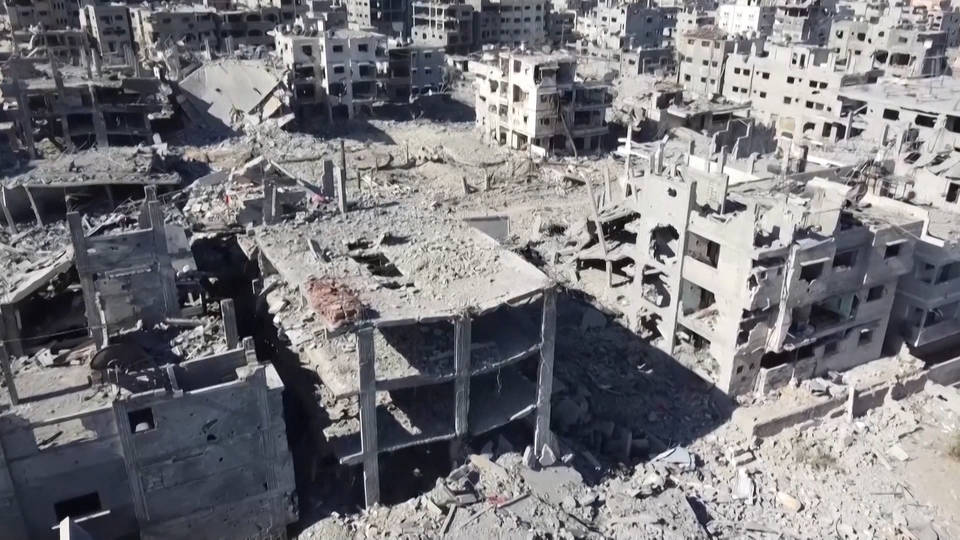
Humanitarian aid has begun to trickle into the Gaza Strip, where over 2 million people face widespread starvation and malnutrition following Israel’s two-year assault that the United Nations and human rights groups have condemned as a genocide.
Earlier today, Israeli military forces in Gaza City killed at least five Palestinians, despite the ceasefire agreement that took effect last Friday. Separately, at least three children were injured Monday by what appeared to be unexploded Israeli ordnance dropped near Al-Shifa Hospital. The United Nations has warned it could take more than a decade to defuse and clean up unexploded bombs and other explosives left behind by Israeli forces.
Thousands of Palestinians in Gaza and West Bank Celebrate Return of Nearly 2,000 Prisoners
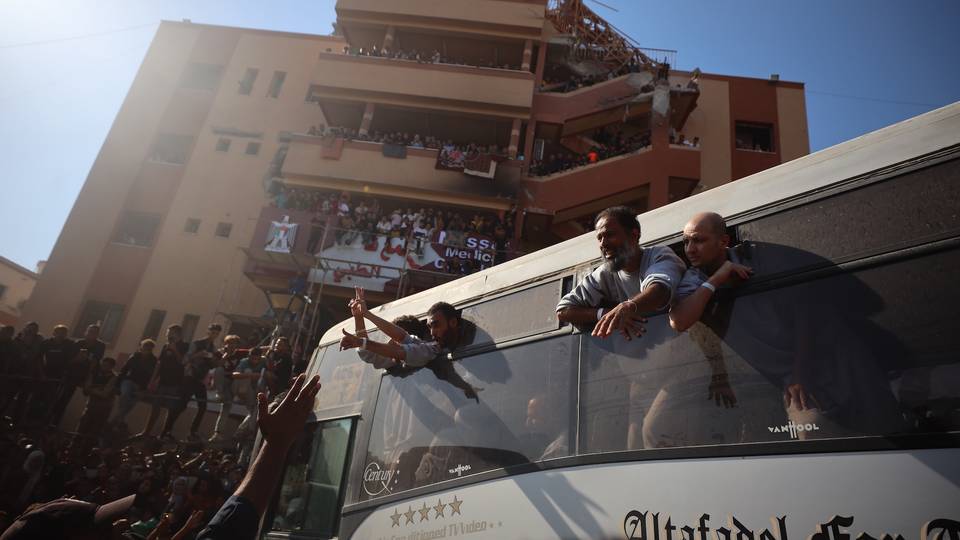
On Monday, thousands of Palestinians gathered in Khan Younis and the West Bank to celebrate the return of nearly 2,000 Palestinian prisoners and detainees freed as part of the ceasefire deal. Many of those released had been jailed by Israel without trial. They showed signs of starvation, medical neglect and torture. This is 48-year-old Palestinian Majed Abid, who was detained nearly two years ago.
Majed Abid: “The situation is extremely, extremely hard for young men — no food, no drink, no medical care. They face constant oppression, torment. I wish everyone would pay attention to their situation. May God protect everyone. Thank God. It’s an indescribable feeling.”
Another 154 Palestinian prisoners were deported by Israel to Egypt rather than returned to occupied Palestine.
Families Demand Hamas Return Bodies of 24 Israeli Hostages

Israeli authorities say they’ve identified the bodies of four hostages returned by Hamas as part of the ceasefire deal, while families express anger that the bodies of 24 other Israelis have not yet been returned. Human Rights groups say Israel holds the bodies of over 700 Palestinians, including dozens of children, whom Israel has used as bargaining chips in negotiations.
Trump Co-Chairs Summit in Egypt for Ceasefire Signing Ceremony; Netanyahu Does Not Attend
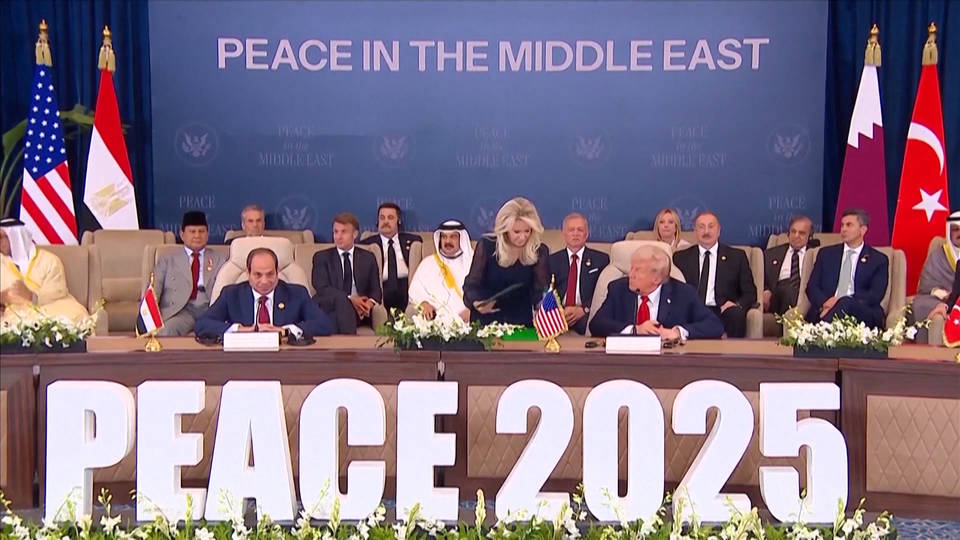
On Monday, President Trump co-chaired a summit in Sharm el-Sheikh with Egyptian President Abdel Fattah el-Sisi. The leaders of over two dozen countries were in attendance for the ceasefire signing ceremony. Israeli Prime Minister Benjamin Netanyahu did not attend. We’ll have more on the Gaza ceasefire deal and the exchange of Israeli and Palestinian captives after headlines.
Journalist Abducted by Israel Says She Was Tortured in Israeli Custody

A journalist who was abducted by Israeli forces last week as she accompanied a Gaza-bound humanitarian aid vessel says she was tortured in Israeli custody alongside activists seeking to break Israel’s siege of Gaza. Noa Avishag Schnall described the abuse in a video statement to Drop Site News, with bruises from her ordeal clearly visible on her face.
Noa Avishag Schnall: “Any flotilla member who upset the Israeli guards was subjected to twisted and tightened handcuffs, and some received beatings. I was hung from the metal shackles on my wrists and ankles and beaten in the stomach, back, face, ear and skull by a group of men and women guards, one of whom sat on my neck and face, blocking my airways. Many comrades, understandably, do not want their identity made public when recounting this treatment. During the evening, the men were tormented by guards with attack dogs and guns. The women were threatened with pepper spray. Our cell was awoken with threats of rape.”
Afghan Taliban Claims Its Forces Killed Dozens of Pakistani Soldiers
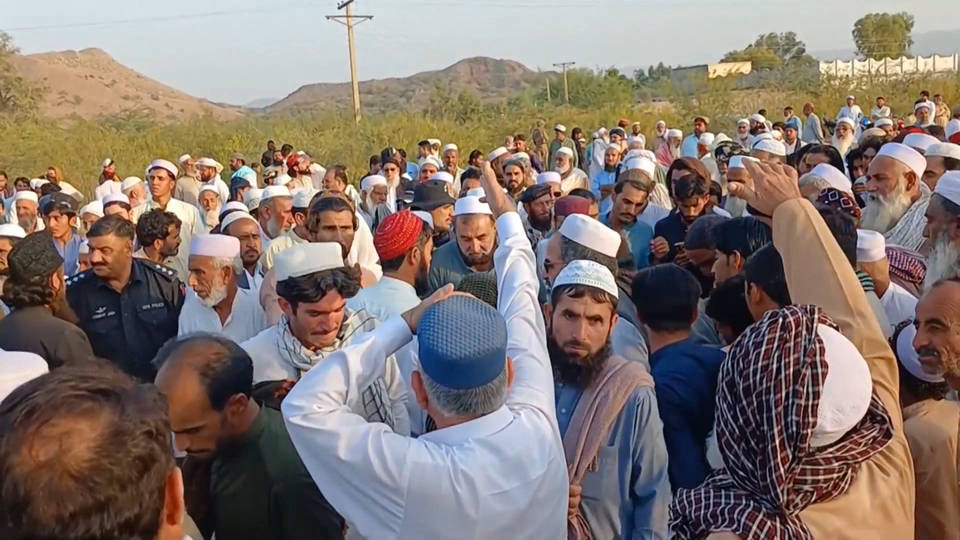
In Afghanistan, the Taliban government says its forces killed dozens of Pakistani soldiers in border clashes over the weekend, in retaliation for airstrikes in Kabul and the bombing of a market in eastern Afghanistan last Thursday. The fighting has halted all trade and transit between the two countries, stranding hundreds of Afghan refugees.
Mohammad Nabi: “We are stranded here because of the war. People say there is fighting at the border. Children, women and the elderly here with us are sick. There is no water or food. We don’t have enough money to survive here for even a few days. They should resolve their issues through dialogue. In war, both countries lose. No one benefits.”
Russian Forces Attack Ukraine’s Second-Largest City Kharkiv
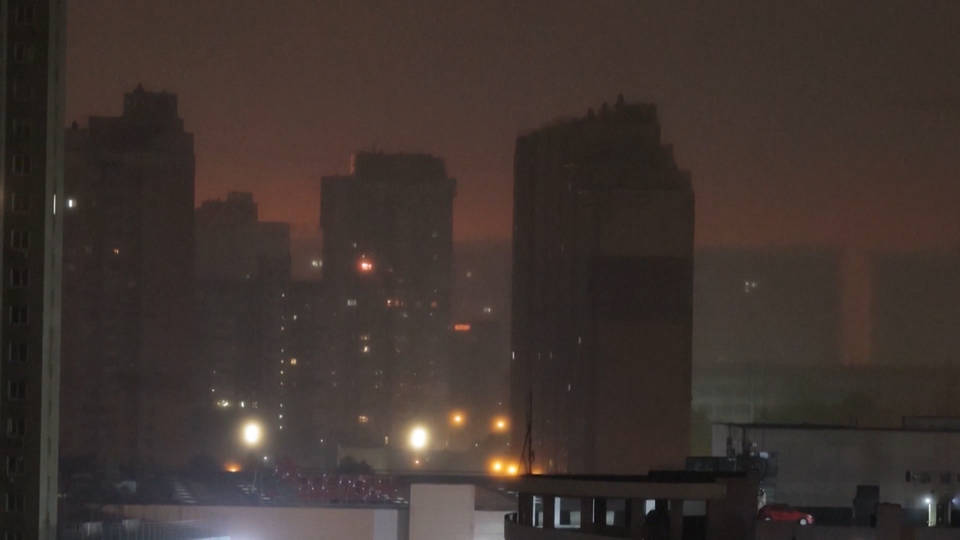
Russian forces attacked Ukraine’s second-largest city Kharkiv with guided bombs overnight Monday, plunging 30,000 customers into darkness after targeting power transmission lines. Four people were injured when three of the bombs struck a hospital.
Natalia Nikityuk: “The first strike was somewhere farther away, and the second, it was very loud. The door flew out. My window burst open. I’m just lucky that I have a ward on the other side. I just sat down, very scared. My heart ached. Not all the wards were fully occupied, but there were people there who suffered from glass injuries because the windows blew out.”
Russia’s latest attack comes as the International Atomic Energy Agency is pressing Moscow and Kyiv to agree to local ceasefires in order to restore electricity to the Russian-occupied Zaporizhzhia power plant, Europe’s largest nuclear facility. The plant has been operating on backup diesel generators since September 23 after fighting severed power lines, leaving it vulnerable to a nuclear disaster. It’s the 10th time — and by far the longest — the plant has lost outside power.
Meanwhile, Ukrainian President Volodymyr Zelensky has announced plans to meet President Trump at the White House on Friday as he seeks additional weapons, including long-range Tomahawk missiles.
Speaker Johnson Warns Government Shutdown Could Be the Longest in U.S. History

In Washington, the federal government shutdown has entered its 14th day. Republican House Speaker Mike Johnson is warning that this could be the longest shutdown in U.S. history. The Senate is expected to vote today for the eighth time to fully fund the federal government, and Senate Democrats say they won’t approve new spending until Republicans agree to extend expiring healthcare subsidies under the Affordable Care Act. The shutdown has caused flight delays, shut off access to national parks, closed taxpayers’ helplines at the IRS and impacted the permitting process at the Environmental Protection Agency and the Transportation Department. Military personnel and their families have increasingly turned to food pantries to make ends meet.
Meanwhile, several airports across the country are refusing to air a video PSA of Department of Homeland Security Secretary Kristi Noem blaming congressional Democrats for the shutdown and resulting flight delays. A spokesperson for Portland International Airport told The Washington Post, “We believe the Hatch Act clearly prohibits use of public assets for political purposes and messaging.”
Several News Outlets Announce They Will Not Sign Pentagon’s New Press Policy
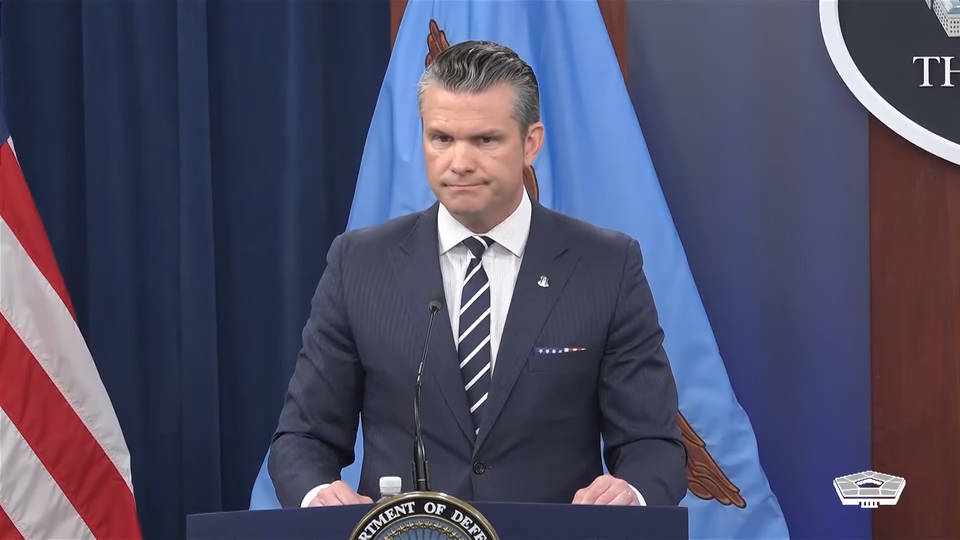
The Washington Post, The New York Times, the Associated Press and CNN, as well as conservative outlets Newsmax and The Washington Times, all announced that they will not sign the Pentagon’s new press policy by today’s deadline. The policy states that media outlets and reporters cannot obtain any information that the Pentagon does not explicitly authorize. Matt Murray, The Washington Post’s executive editor, said, “The proposed restrictions undercut First Amendment protections by placing unnecessary constraints on gathering and publishing information.” In response, Defense Secretary Pete Hegseth posted on X a hand-waving emoji.
2003 CIA Cable Details Torture Methods Against a Detainee at a Black Site

A 2003 CIA cable details stunning torture methods against a detainee at a black site, carried out without permission and removed from reports to headquarters. The cable recounts how an interrogator put a cordless drill close to Abd al-Rahim al-Nashiri’s body and pressed the “on switch” and “let the drill run.” The incident reportedly took place weeks after al-Nashiri was waterboarded at the CIA black site. A handgun was also held to al-Nashiri’s head after he had been forced to stay awake for two-and-a-half days in a stress position, which involved chaining his arms above his head while he was naked or wearing only a diaper. Al-Nashiri was later charged in the 2000 bombing of the USS Cole. A military judge, Colonel Lanny J. Acosta Jr., rejected al-Nashiri’s statements in detention, writing, “Any resistance the accused might have been inclined to put up when asked to incriminate himself was intentionally and literally beaten out of him years before.” Al-Nashiri’s trial is set to start in June 2026 at the US naval base in Guantánamo Bay, Cuba.
Madagascar’s President Flees the Country Following “Gen Z” Protests
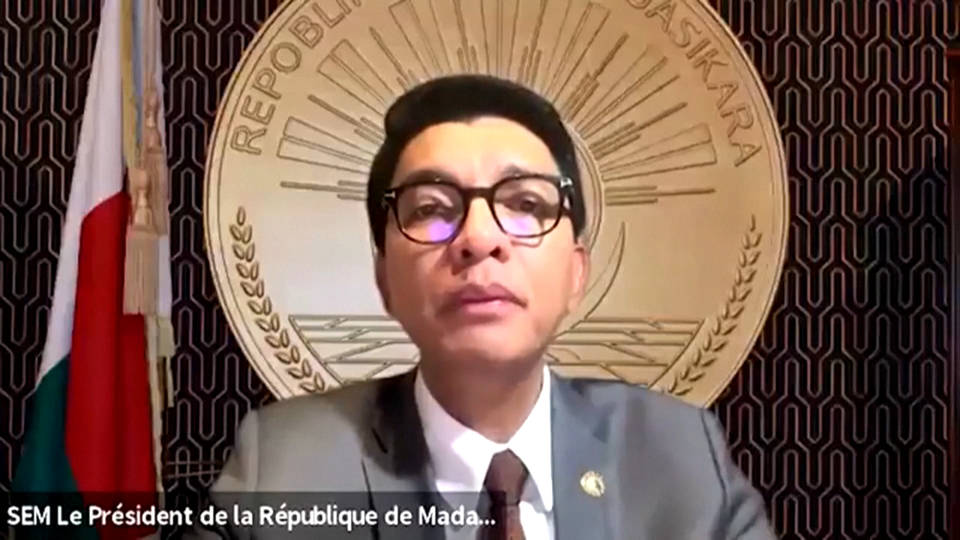
Madagascar’s president says he’s fled the country following “Gen Z” protests that erupted last month demanding his ouster — and after soldiers threw their support behind the protests. Reuters reports Andry Rajoelina left Madagascar on Sunday aboard a French military aircraft. A crackdown on dissent by his forces killed at least 22 people, according to the United Nations. On Monday, thousands gathered in Madagascar’s capital to mourn the dead and to demand justice.
Fitahiana Rajaonary: “The evacuation of Andry Rajoelina was an act of interference by France in Madagascar. Why? Well, because it wasn’t a coup d’état; it was just a call from the people, a call for freedom of expression.”
United Nations: 300,000 People Have Fled South Sudan in 2025
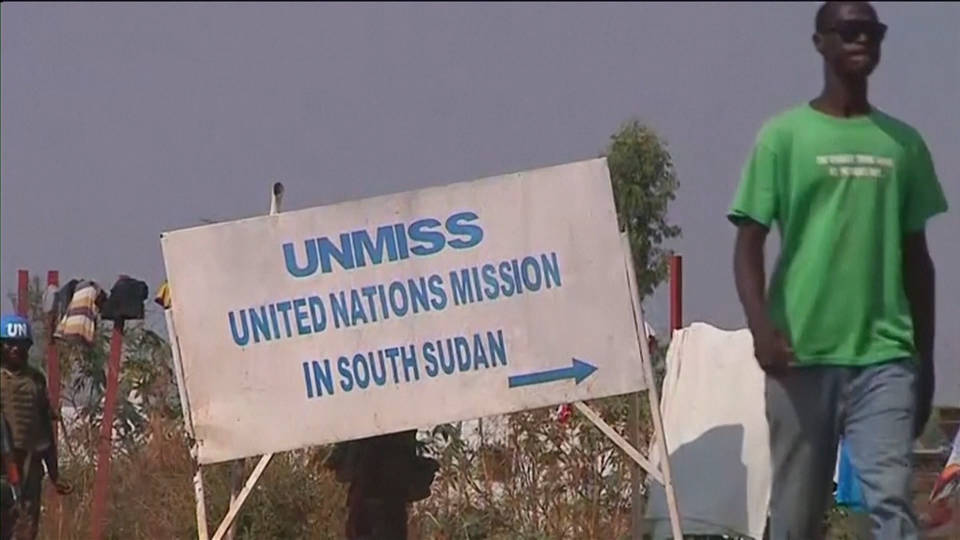
The United Nations warns some 300,000 people have fled South Sudan this year amid renewed fighting that’s threatening to return the nation to civil war. The conflict grew worse after the arrest of First Vice President Riek Machar unraveled a fragile power-sharing agreement. South Sudan gained U.N. recognition as the world’s newest nation in 2011, but a civil war that erupted in 2013 led to an estimated 400,000 deaths.
Economists Demand Relief for Poorer Countries Facing Unsustainable Debt Burdens
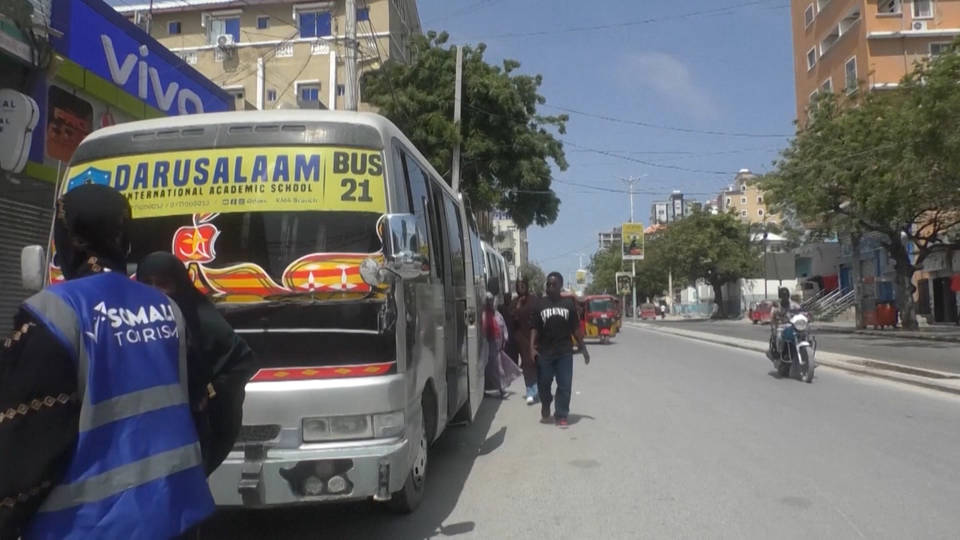
A coalition of leading economists and former finance ministers is calling for immediate debt relief to low- and middle-income nations, warning loan repayments are squeezing out government funding for basic services, leading to poverty and preventable deaths. In a letter to the World Bank and IMF ahead of annual meetings this week, the economists, including Columbia University professor Joe Stiglitz, write, “Countries around the world are paying exorbitant debt servicing costs instead of paying for schools, hospitals, climate action or other essential services.”
64 Are Dead and Dozens Missing in Mexico After Heavy Rains Bring Flooding to Five States
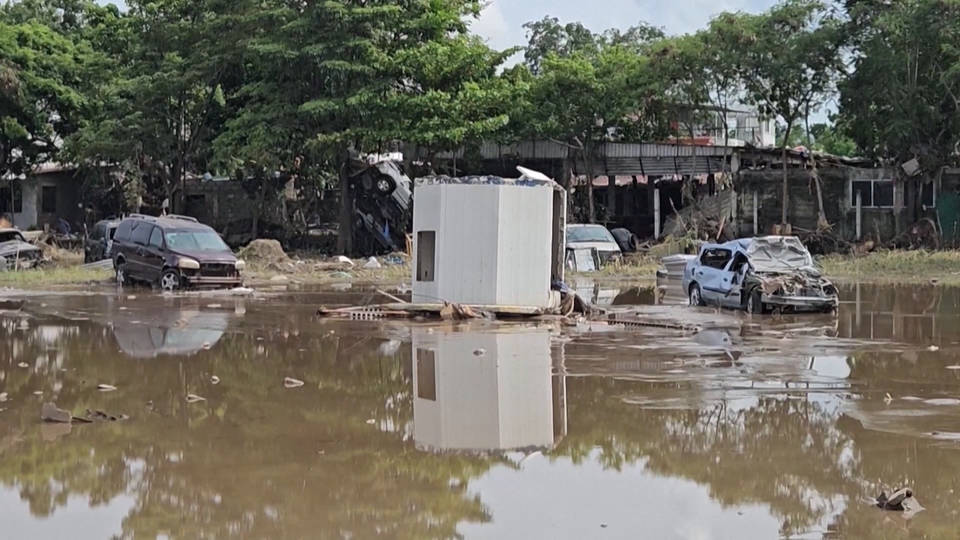
In Mexico, at least 64 people are dead and dozens remain missing after tropical storms triggered severe flooding across five states. Authorities say some 100,000 homes have been affected.
In Alaska, Coast Guard and National Guard search-and-rescue crews have rescued dozens of people in coastal villages on the Bering Sea after the remnants of Typhoon Halong brought hurricane-force winds, storm surge and severe flooding to the region.
Meanwhile, on the U.S. East Coast, at least three people are dead as a slow-moving nor’easter brings coastal flooding, winds and heavy rain to mid-Atlantic and northeastern states for a fourth consecutive day. A recent study authored by University of Pennsylvania climate scientists, including Michael Mann, found human-driven climate change is making the strongest nor’easters even stronger.
New York AG Letitia James Campaigns for Zohran Mamdani, Warning of Trump’s Retribution Campaign
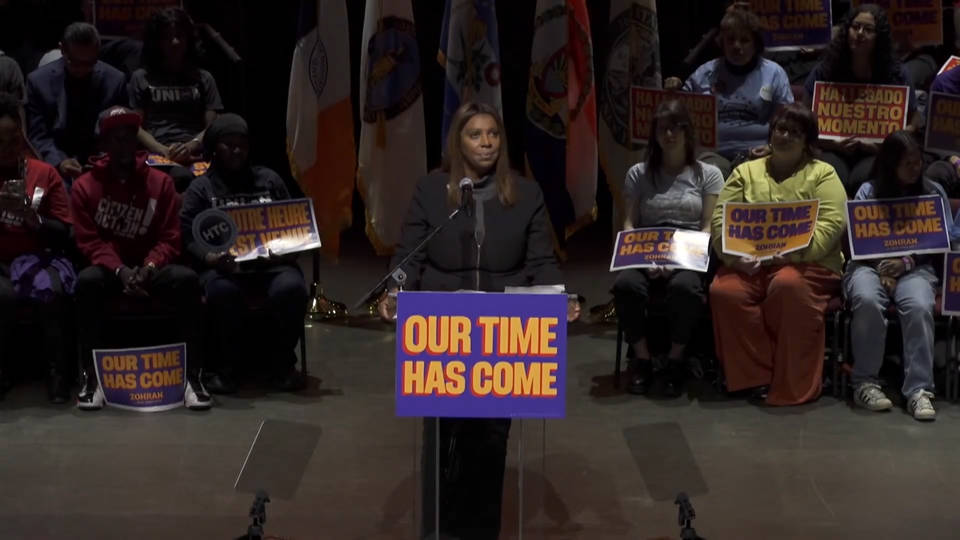
New York Attorney General Letitia James spoke publicly for the first time since her federal indictment at a campaign rally for New York City mayoral candidate Zohran Mamdani on Monday. James has been indicted on mortgage fraud charges, which she denies, after President Trump called for his political enemies to be jailed. She’s being prosecuted by Trump’s hand-picked U.S. attorney for the Eastern District of Virginia, Lindsey Halligan, after Trump forced out the previous Trump-appointed U.S. attorney for refusing to bring charges. At the rally, Mamdani and James presented a united front against President Trump, warning about the threat he poses to democracy.
Attorney General Letitia James: “We are witnessing the fraying of our democracy, the erosion of our system of government. This, my friends, is a defining moment in our history. Let us stand together to defend our rights, to protect every safeguard, every institution, every immigrant.”
Zohran Mamdani: “We are an existential threat to billionaires who think their money can buy our democracy. We are an existential threat to a broken status quo that buries the voices of working people beneath corporations. And we are an existential threat to a New York where a hard day’s work isn’t enough to earn you a good night’s rest.”
Most popular
- 1
- 2
- 3
- 4
Non-commercial news needs your support
Please do your part today.



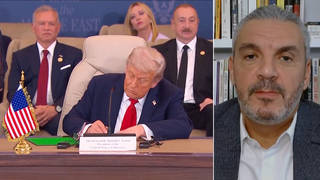






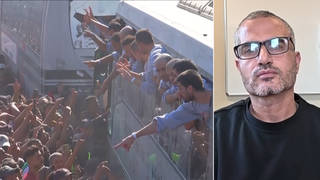
Media Options